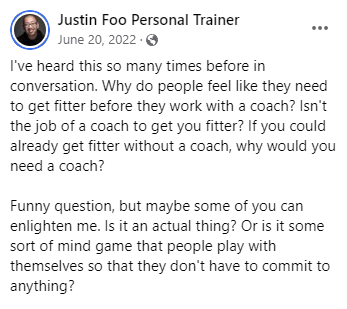Why I Have a Personal Trainer: Overcoming Embarrassment and Boosting Fitness Confidence
In a previous fitness post, I shared my personal journey of having a personal trainer. The truth is, while I genuinely aspire to stay fit and exercise, I often lack the motivation and willpower to do it alone. That's why I rely on the guidance and accountability of a personal trainer who pushes me to become a better version of myself.
Some time ago, Justin, my trainer, posed an interesting question on social media: Why do people feel the need to improve their fitness before hiring a coach? Drawing from my own experiences, I'd like to shed light on this topic based on my perspective.
 |
Addressing Expectations
It's important to debunk the misconceptions surrounding personal trainers. Contrary to what we often see in movies or reality TV shows, trainers cater to individuals at various stages of their fitness journeys. So forget any preconceptions of needing to be one of the beautiful people using trainers for maintenance or being a potential candidate for some diet show, destined for torture and humiliation.
 |
| Trainers train all sizes |
Considering Financial Factors
Let's face it—personal training can be expensive! Some individuals choose to improve their fitness independently and only consult a trainer for occasional sessions, typically on a weekly or bi-weekly basis, to develop a tailored exercise regimen or receive advanced and specialized training. This approach helps manage expenses while still benefiting from professional guidance. I saw a trainer myself for specialized training when I was doing kickboxing in the past.Confronting Lack of Confidence
Personally, one of the reasons I've felt the need to become fitter before seeking a trainer is to avoid the embarrassment! We've all been conditioned to care about what others think, and the shame associated with not being in optimal shape can be overwhelming. It's a vicious cycle because if I had already achieved and maintained my fitness goals, I wouldn't need a trainer in the first place!This feeling intensifies when you've been fit in the past or were happier with your previous self. Now, the added pressure of knowing that you let personal circumstances (such as finances, injuries, convenience, family, work, etc.) hinder your progress brings about an extra sense of shame—of "letting yourself go." It's silly cos life happens and that's a fact.
For those contemplating hiring a personal trainer, the initial meeting often involves a general interview process. Trainers ask about your fitness level, exercise history, dietary habits, and other health-related questions to gain an understanding of where you're starting from. It can be really uncomfortable to admit your entire nutritional needs comes from fast food or struggling with basic exercises like push-ups and squats. However, this process is not meant to shame you; it's simply a means for the trainer to gauge your capabilities and customize an exercise regimen that aligns with your current fitness levels and goals. It's also an opportunity to assess compatibility and ensure there are no personality clashes between the trainer and client. After all, no one wants to train with someone they're uncomfortable with.
 |
| Doing squats can suck |
The Role of a Good Trainer
A competent trainer should possess adaptability and observational skills. I've encountered trainers who made the workouts too easy, failed to recognize when I genuinely struggled, or couldn't adjust exercises based on my fitness level at the time. If a trainer consistently struggles to assess your abilities after a few sessions, they may not be the right fit for you. On the other hand, when I have confidence in my trainer, I'm more willing to attempt exercises that initially seem impossible. Do check out the gym I go to: Built for Function |
| Sometimes I just want an easy set. |
In conclusion, answering Justin's question based on my own experiences, it boils down to a combination of embarrassment and ego. This feeling is heightened when you have prior training knowledge and are aware of your capabilities, leading to a desire to get fitter before engaging



I appreciate how this personal trainer takes the time to delve into the nitty-gritty details, leaving no stone unturned. It's evident that they're passionate about sharing their expertise and helping others on their fitness journey. Thank you for such a comprehensive and informative blog!
ReplyDeleteAffordable Personal Trainers in Alabama